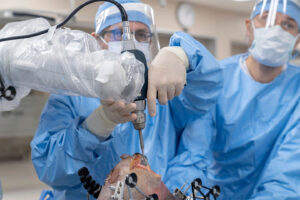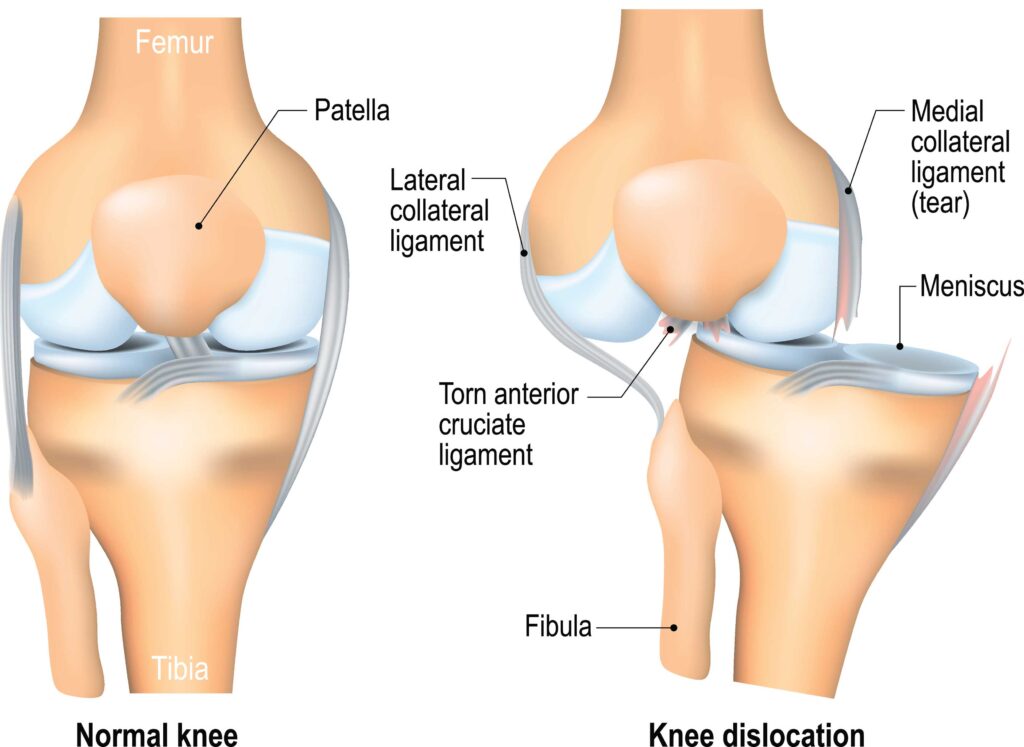
Knee Dislocation
Knee Dislocation:

Orthopaedic physicians at the forefront of addressing such injuries provide valuable insights.
A dislocated knee typically occurs following a traumatic incident such as a fall, high-speed car injury, or severe sporting accident. While, in some cases, a dislocated knee may spontaneously return to its normal position, this process is often painful and complex. Patients might require anesthesia or a pain block to facilitate the reduction of the dislocated knee.
For detailed knowledge and expert guidance on dislocated knees, visit the website and gain insights into innovative approaches and personalized care provided by Dr. Raviteja and the dedicated team.
Knee Dislocation Types and Their Impact on the Knee:
Physical Deformity – Crooked Appearance:
Learn about the noticeable physical deformity associated with a dislocated knee, often characterized by a crooked or misaligned appearance.
Severe Pain:
Understand the severity of pain experienced with a dislocated knee, a common and distressing symptom that often accompanies this injury.
Numbness Below the Knee:
Discover the potential symptom of numbness below the knee, which may be indicative of nerve involvement in the dislocation.
Absent or Diminished Pulses in Some Cases:
Learn about the vascular aspects of a dislocated knee, including cases where pulses may be absent or diminished, emphasizing the importance of prompt medical attention.
Treatment for Knee Dislocation:
Immediate assessment of vascular and nerve function status is paramount following such injuries. In cases of more severe knee dislocations, a CT angiogram may be necessary to evaluate potential popliteal artery injuries. Additionally, careful evaluation for nerve damage, particularly to the common peroneal and tibial nerves, is essential at the time of injury.
Most dislocated knees entail injuries to three or four major knee ligaments, including the ACL, PCL, posterolateral corner, and the medial knee structures (such as the medial collateral ligament and posterior oblique ligament). Furthermore, injuries may extend to the medial or lateral meniscus, articular cartilage, fractures, or patellar tendon injuries. A thorough assessment involving history, physical examination, x-rays, MRI scans, and other necessary studies is crucial for accurate diagnosis and effective management.
Symptoms and Causes:
Recognizing the critical role of surgical expertise, Dr. Raviteja emphasizes the significance of outcomes being optimized when surgeries are performed by surgeons experienced in handling dislocations regularly and in large volumes. This expertise ensures familiarity with injury patterns, a skilled surgical team, access to a diverse supply of allograft ligaments for reconstruction, and other crucial factors.
Dr. Raviteja is committed to providing each patient with these essential components, offering comprehensive care for dislocated knees and complex knee injuries. Timely intervention is crucial, and generally, the best results are observed when treatment is initiated within the first 3-4 weeks of injury.
Various confounding factors can influence the treatment approach, including:
1. History of Popliteal Artery Bypass Surgery:
Individuals with a body mass index (BMI) of 30 or higher are seven times more likely to develop knee osteoarthritis.
2. Presence of a Blood Clot:
Learn about the considerations and challenges involved when a blood clot is present alongside a dislocated knee.
3.Significant Swelling:
Explore the implications of a substantial amount of swelling on the treatment strategy for a dislocated knee.
4. Knee Stiffness:
Understand how knee stiffness can be a confounding factor and influence the approach to managing a dislocated knee.
5.Abrasions or Lacerations Requiring Delay in Surgery:
Recognize the complexities introduced when abrasions or lacerations are present, potentially necessitating a delay in the surgical intervention.
Are you experiencing knee dislocation?
There are two ways to initiate a consultation with Dr. Ravi Teja Rudraraju
You can provide current X-rays and/or MRIs for a clinical case review with with Dr. Ravi Teja Rudraraju
You can schedule an office consultation with Dr. Ravi Teja Rudraraju
Frequently Asked Questions
Provide a basic overview of knee dislocation, explaining the nature of the injury and the structures involved.
Explore the common causes and scenarios that can lead to a knee dislocation, including traumatic events or accidents.
Detail the diagnostic process for identifying a knee dislocation, including medical examinations and imaging techniques.
Offer guidance on initial actions to be taken post a knee dislocation, emphasizing the importance of prompt medical attention.
Discuss the treatment options, including surgical and non-surgical approaches, based on the severity of the knee dislocation.
Address possible complications, such as vascular or nerve damage, associated with knee dislocations and their implications.
Provide insights into the optimal timing for treating a knee dislocation and how it can impact the overall outcomes.
Discuss the potential long-term effects or challenges that individuals may face following a knee dislocation.
Outline rehabilitation exercises and strategies designed to aid in the recovery and rehabilitation process after a knee dislocation.
Explore various factors, including surgical expertise, timing, and patient-specific considerations, that can influence the success of knee dislocation surgery.
Conclusion:
At Dr. Ravi Teja’s clinic, we are dedicated to understanding, diagnosing, and treating Knee Dislocation effectively. If you’re ready to take the next step towards relief, feel free to initiate a consultation through X-ray and MRI reviews or schedule an in-person visit. We look forward to guiding you on your journey to improved knee health.
Latest Post

